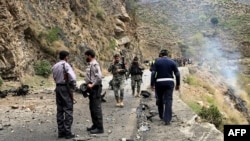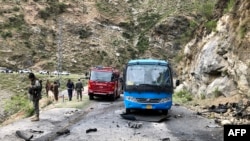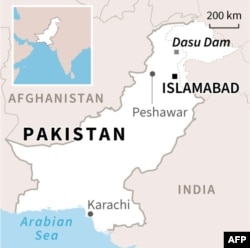Police in northern Pakistan said Tuesday that at least five Chinese nationals and their local driver were killed when a suicide bomber rammed his explosives-laden car into their convoy.
The attack occurred on the main highway linking Pakistan to China.
Beijing swiftly denounced what it called a terrorist attack and demanded Pakistani authorities bring the perpetrators to justice.
Local police officer Bakht Zahir told VOA an investigation into the "suicide blast" was underway.
No group immediately claimed responsibility for one of the deadliest attacks on Chinese nationals in recent years.
Pakistani President Asif Ali Zardari condemned the attack and conveyed his condolences to the victims’ families and the government in neighboring China.
"Forces hostile to Pakistan will never succeed in damaging the Pakistan-China friendship," Zardari said.
The victims were traveling to the Chinese-funded Dasu hydropower project under construction in the district of Kohistan when the bomber coming from the opposite side hit them.
In a statement, the Chinese Embassy in Islamabad demanded that the Pakistani government immediately conduct a thorough investigation into the deadly bombing.
The diplomatic mission urged Pakistani authorities to “take practical and effective measures to protect the safety of Chinese citizens, institutions, and projects to prevent such incidents from happening again.”
Prime Minister Shehbaz Sharif visited the Chinese Embassy to offer condolences over the death of Chinese nationals in the suicide attack, his office said.
This is not the first time Chinese nationals have come under attack in the mountainous region.
In mid-2021, a suicide car bombing targeted a bus convoy of Chinese engineers working on the biggest hydropower project in Pakistan, killing nine Chinese nationals and three of their local co-workers.
Thousands of Chinese engineers and laborers are working in Pakistan. Most of them are associated with the China-Pakistan Economic Corridor, or CPEC, which is an extension of Beijing’s global Belt and Road Initiative infrastructure program.
“Today’s attack was orchestrated by the enemies of Pakistan-China friendship. We will resolutely act against all such forces and defeat them,” the Pakistani foreign ministry said in a statement. “Pakistan will continue to work with our Chinese brothers in ensuring the safety and security of Chinese nationals, projects, and institutions in Pakistan.”
Mushahid Hussain, the head of the Islamabad-based independent Pakistan-China Institute, described Tuesday’s attack as a “monumental security breach.” The former Pakistani senator criticized his government in comments posted on X, saying Islamabad’s commitments to provide ‘foolproof security’ to Chinese workers “ring hollow” in the wake of repeated high-profile attacks on them.
Tuesday’s attack came a day after separatist insurgents stormed Pakistan’s second-largest naval aviation base in southwestern Baluchistan province. The military said that security forces killed all four assailants, and a Pakistani soldier died in the ensuing clashes.
The so-called Baloch Liberation Army (BLA), designated as a global terrorist organization by the United States, took responsibility for the attack.
Last week, eight heavily armed insurgents stormed a government compound in Baluchistan’s Gwadar district, home to a China-operated port. The ensuing gunfight killed all the assailants and left several Pakistani security personnel dead. The BLA claimed its fighters carried out the raid.
The deep-water Gwadar port is located near the Strait of Hormuz, a crucial oil shipping route in the Arabian Sea. It is run by a Chinese state company and is a centerpiece of the multibillion-dollar bilateral CPEC collaboration.








